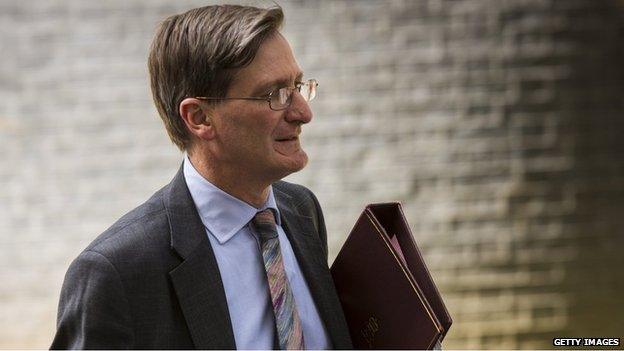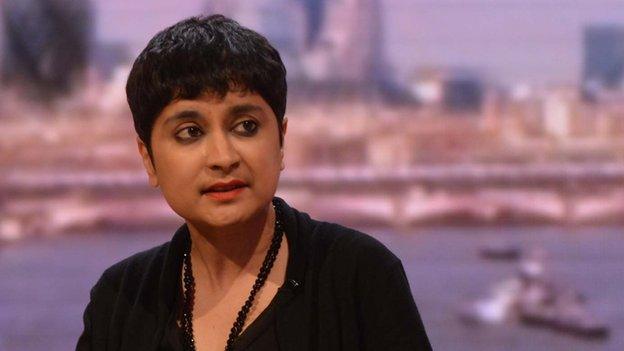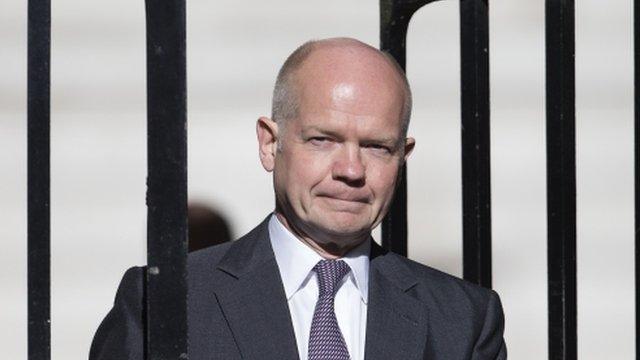Dominic Grieve 'sad' to lose job as attorney general
- Published

Dominic Grieve has said he was "sad" to lose his job as Attorney General for England and Wales in the reshuffle.
Mr Grieve, who has been the government's most senior legal adviser since 2010, was among a string of casualties as Prime Minister David Cameron made changes to his top team.
"I would have very happily stayed on," he told BBC Radio 4's The World at One.
In government, he had been one of the most vocal supporters of the European Convention on Human Rights.
"I have had a very fulfilling and interesting four years in the job," he said.
"It's quite a demanding job. I hope I've been able to do it properly, and if the prime minister had wanted me to continue I'd have done so cheerfully, but it's a matter for him."
'No protection'
He was asked about his advocacy of the European Convention on Human Rights.
"You only have to open a newspaper to see that there is a public perception that the convention and its application with the Human Rights Act prevents British governments from doing things that they ought to be doing to protect the public," he said.
"Occasionally I think the European Court of Human Rights gets it badly wrong, such as over prisoner voting.
"But there is a point that the UK is at the heart of an international system of law. I think there are 13,200 treaties that we have signed since the Congress of Vienna in 1815.
"Whilst we can pull out very easily from the European Convention on Human Rights if we wanted to, there would be serious reputational issues if we were to do it.
"You only have to look at some of the problems that we have in Europe at the moment to see that if we send out a sign that human rights don't matter, that is likely to be picked up in other countries that are also signatory states, such as Russia."
He questioned whether any system that might replace the convention would be an improvement.
"As I understand it the suggestion has been that what we would put in its place is a Bill of Rights that incorporates all of the convention rights," he said.
"If that were to happen then I have to say that the interpretation by our own national courts of those rights is only likely to be slightly different from the way it is interpreted in Strasbourg.
"The alternative is to have no protection of human rights at all in the country. But seeing the growth in the power of the state I have to say I find that a really extraordinary concept.
"Britain's history is a series of markers where the common law has been improved by statute to protect rights, whether it is Magna Carta, habeas corpus, the Bill of rights of 1689, or indeed the European Convention on Human Rights and indeed the Human Rights Act."
'One of the finest'
He also appeared to warn his party leadership that being sacked would be unlikely to stop him speaking out on the subject.
"These are issues over which I think there has to be very careful, rational debate. If I can help to participate in that debate now I'm on the backbenches, I will be happy to do so," he said.

Shami Chakrabarti paid tribute to the outgoing attorney general
The director of campaign group Liberty, Shami Chakrabarti, said: "Dominic Grieve QC is one of the finest attorneys general of modern times who always put the law first and populist politics second.
"The coalition government has lost one of its sharpest minds, but the country may have gained a freer and even more outspoken advocate for human rights."
In 2012, Mr Grieve appeared at odds with Mr Cameron and Justice Secretary Chris Grayling during the controversy over giving prisoners the right to vote.
While the PM pledged to defy a European Court of Human Rights ruling that a blanket ban on voting for anyone sent to jail was illegal, Mr Grieve publicly argued that the UK had a legal duty to implement the judgement.
"The issue is whether the United Kingdom wishes to be in breach of its international obligations and what that does to the reputation of the United Kingdom," he said.
It could, he said, be seen "as a move away from out strict adherence to human rights laws".
Mr Grieve has been replaced by Conservative MP Jeremy Wright, a barrister who specialised in criminal law.
- Published14 July 2014

- Published15 July 2014
- Published14 July 2014
